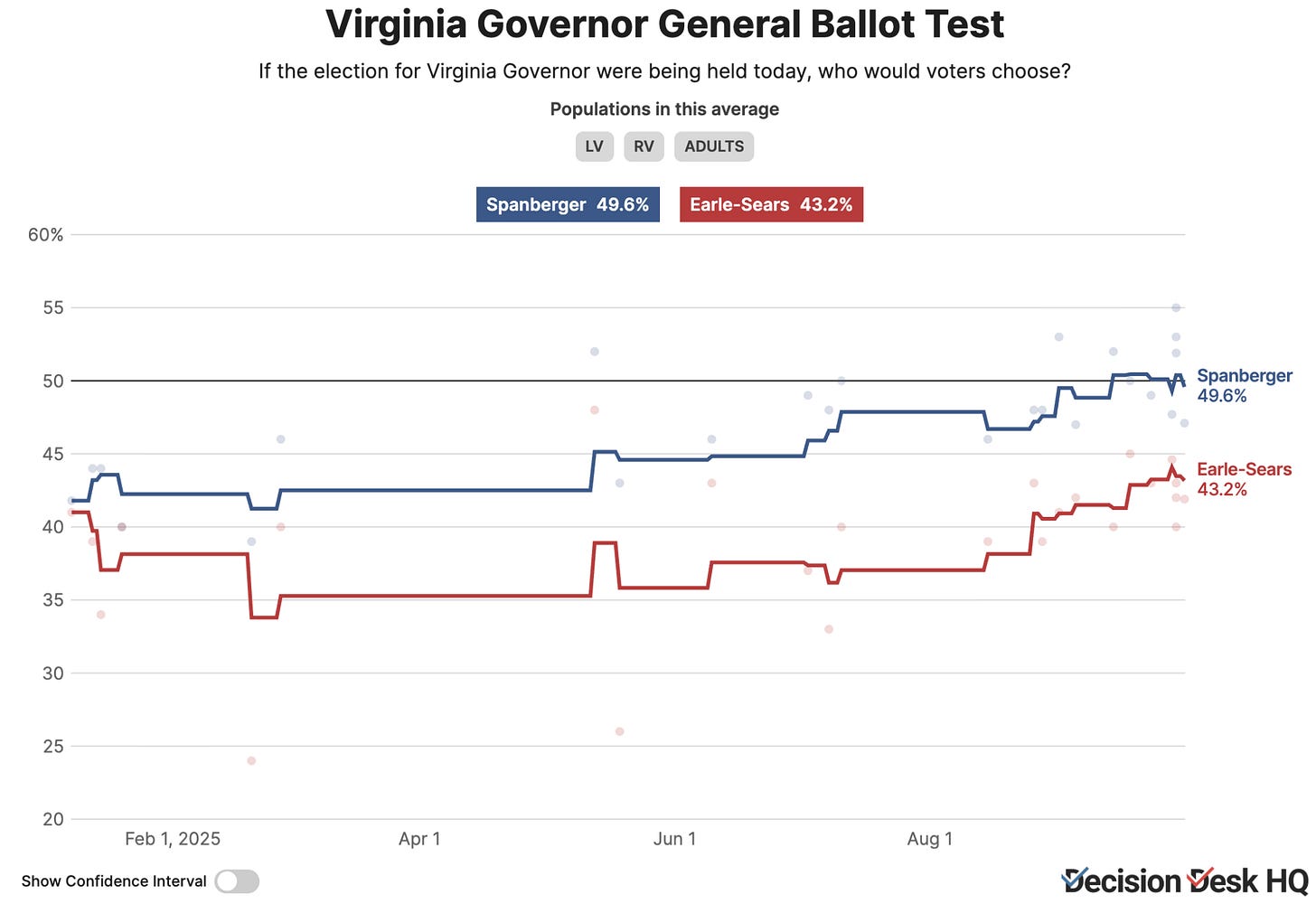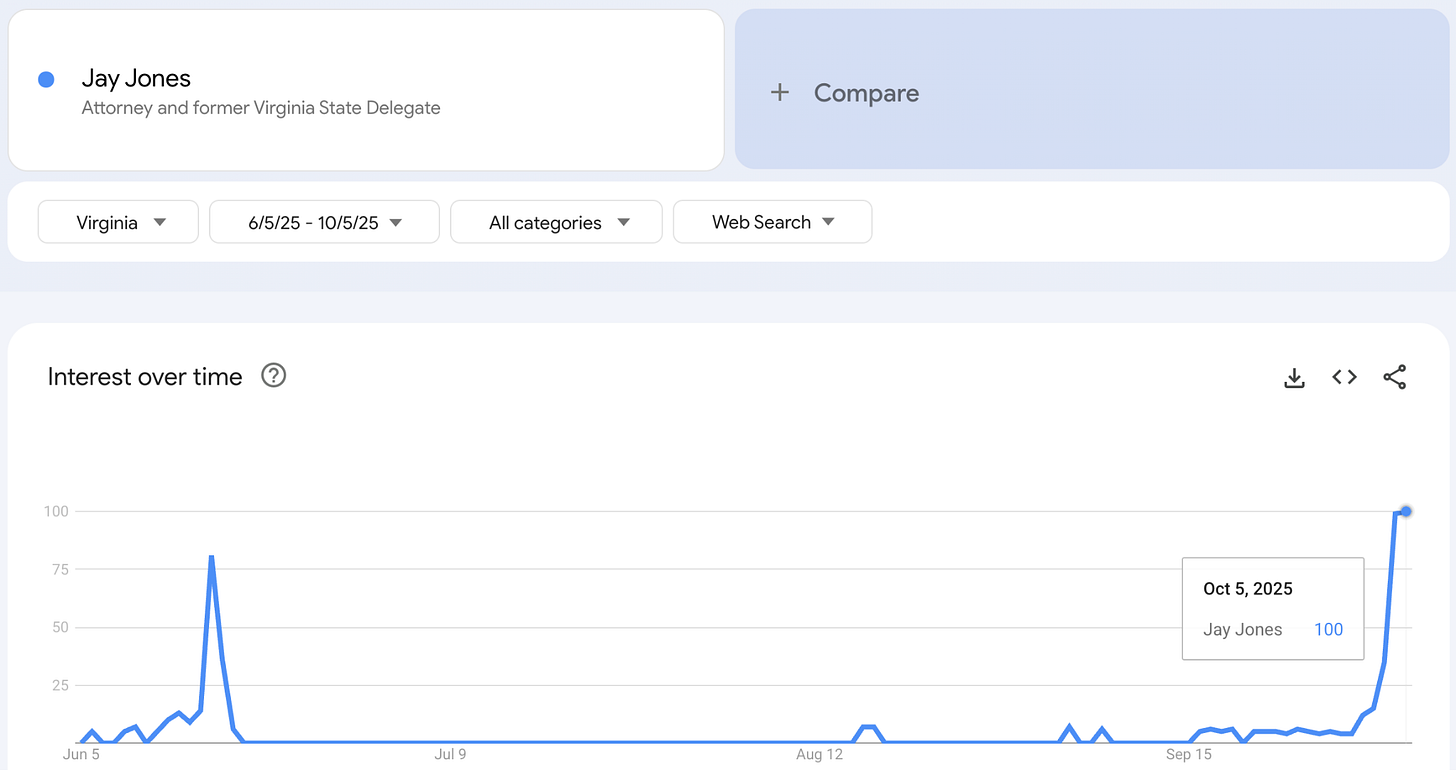Could Virginia Democrats snatch defeat from the jaws of victory?
 Taber Andrew Bain via Wikimedia Commons (CC 2.0)🍺 What’s on tap 🚰
Taber Andrew Bain via Wikimedia Commons (CC 2.0)🍺 What’s on tap 🚰Today’s newsletter features:
Opening Bell: Must-read items about elections and politics.
The Frontrunner: Democrats have had good reason to hope that they can sweep Virginia’s statewide races. But a text message scandal could give the GOP an opening in the contest for attorney general.
DDHQ Quarterly Report: An excerpt on geographical trends in the 2024 presidential election from Decision Desk HQ’s September 2025 quarterly report.
Around the Corner: Upcoming elections we’re tracking at DDHQ.
🔔 Opening Bell 🐏Must-read items about elections and politics.
Republican Rep. David Schweikert announced he would run for governor in Arizona, joining a GOP field that already features Rep. Andy Biggs and 2022 gubernatorial candidate Karrin Taylor Robson. Schweikert will leave behind the highly competitive 1st District in the Phoenix area, already a top Democratic target in the 2026 midterms. This video provides an overview of my initial reaction to Schweikert’s move.
Just days ahead of the Oct. 7 primary for the Dec. 2 special election in Tennessee’s 7th Congressional District, President Donald Trump endorsed Matt Van Epps, former Tennessee commissioner of General Services under Republican Gov. Bill Lee. In response, state Rep. Lee Reeves dropped out and endorsed Van Epps in the crowded GOP primary race.
I recently spoke with NewsNation anchor and national correspondent Leland Vittert about his new book, Born Lucky: A Dedicated Father, A Grateful Son, and My Journey with Autism. If you want to get some behind-the-scenes looks at Fox News during the 2020 presidential election, I recommend checking out our conversation.
Please subscribe to our Polling Memo! The weekly writeup features key trends based on DDHQ’s polling averages. If you’re already a subscriber to The Bellwether, you can receive the memo in your inbox by clicking on your account settings and opt to receive the Poll Memo (see the image below).

Quick summary:
The president’s party consistently loses ground in Virginia’s statewide elections, which occur a year after the last presidential contest. In keeping with this trend, Democrats look to have the upper hand in 2025.
However, the state may be competitive enough that Republican Attorney General Jason Miyares could win reelection even if his ticketmates go down to defeat.
Miyares could gain ground in the wake of revelations about a series of text messages sent by his opponent, Democrat Jay Jones, that fantasized about shooting and killing a Republican politician in Virginia.
Virginia always hosts one of the two gubernatorial elections that take place in the year following the presidential election. But unlike New Jersey, its gubernatorial counterpart, Virginia is the only state with multiple statewide offices on the ballot. This November, Virginians will cast separate votes for governor, lieutenant governor, and attorney general.1
In our polarized political era, the same party has swept all three offices in each of Virginia’s past four statewide elections, from 2009 to 2021. And helpfully for the party that has the upper hand, Virginia’s statewide races have tended to have very similar margins of victory, evidence that few voters are open to splitting their votes for candidates from different parties. This trend only makes it more difficult for the underdog party to overcome electoral headwinds to break through and win at least one of the three races.
But Virginia’s 2025 statewide contests will test these recent patterns. Until recently, Democrats have led most polls in the races for each of the statewide contests, though to varying degrees. Yet the race for attorney general features a Republican incumbent, Jason Miyares, who likely has the best chance of overcoming what looks to be a Democratic-leaning electoral environment. Not only has Miyares outspent his opponent, Democrat Jay Jones, but recently Jones has had a spate of negative headlines that could find purchase with the electorate and have an impact on the race.
Dems have history — and the electoral environment — on their sideOver the past half century, a party’s best guarantee to win Virginia’s statewide posts has been to lose the preceding presidential election. The electorate’s response to the president in elections the following year has generally worked out well for the party not in the White House. Democrats have reason to think this will happen again in 2025.
This anti-presidential party pattern has played out most obviously in races for governor, in part because Virginia is the only state that does not permit incumbent governors to seek immediate reelection after one four-year term. (However, lieutenant governors and attorneys general can seek reelection, as Miyares illustrates.) With the usual boost from incumbency removed from the equation, Virginia regularly swings away from the president’s party in gubernatorial elections. In 12 races from 1977 to 2021, the White House party consistently lost ground in Virginia compared with its performance in the state’s presidential vote the year prior.
In that time, the party that lost the last presidential race has won 11 of 12 gubernatorial elections. The lone exception came in 2013, when Democrats narrowly won the governorship even though President Barack Obama had won reelection in 2012. However, Republicans still did slightly better in the 2013 race in terms of their margin: Republican Ken Cuccinelli lost by 2.5 percentage points after Republican Mitt Romney lost Virginia by 3.9 points.
The trend in the lieutenant governor and attorney general races has been similar, if not as consistent. In the same period, the party outside the White House has performed better in 9 of 12 lieutenant governor contests and 11 of 12 attorney general races. Broadly speaking, the four cases that ran counter to the usual pattern each featured especially strong or weak candidates who outperformed or underperformed the rest of their party’s ticket.
Critically, recent elections have also shown an uptick in straight-ticket voting across all three offices, a condition that makes it more likely that we will see a relatively consistent swing toward the party outside the White House. While each contest involves a separate vote, fewer voters have shown an inclination to support one party in one race and the other party in another.
Just consider one simple measure illustrating this trend: the decline in the range between the most Democratic-leaning and most Republican-leaning results across the three races. In recent years, the final vote margins for each statewide contest have all looked pretty similar. This includes just a 1.1-point gap in 2021 (from a 1.9-point GOP win to a 0.8-point GOP win) and a 3.4-point gap in 2017 (from an 8.9-point Democratic win to a 5.5-point Democratic win).
In fact, the only notable outlier from 2009 through 2021 came in 2013, when Democrat Ralph Northam defeated Republican E.W. Jackson by almost 11 points in the lieutenant governor’s race. That contest ranks among the four exceptions mentioned above (Northam did 7 points better than Obama’s 2012 showing), and resulted from Jackson proving to be an especially bad candidate. Jackson likely only won the GOP nomination because the party used a convention system that gave conservative activists outsized influence compared to a primary, and he made a laundry list of controversial comments that hurt his campaign.
Polling for the 2025 gubernatorial contest suggests that this election will likely be Democratic-leaning, placing it largely in line with past cycles. Former Rep. Abigail Spanberger, the Democratic nominee, is favored to defeat Republican Lt. Gov. Winsome Earle-Sears, with the winner set to become Virginia’s first woman governor. In Decision Desk HQ’s polling average, Spanberger leads by a little more than 6 points, and she has not trailed in a poll once this cycle. Given the small differences we’ve seen recently across statewide races, a Spanberger victory by a margin in that vicinity (or more) might signal an environment too difficult for Republicans to win either of the other two statewide offices.
 Polling average for Virginia governor as of 9 p.m. Eastern on Oct. 5, 2025.
Polling average for Virginia governor as of 9 p.m. Eastern on Oct. 5, 2025.Spanberger and Democrats as a whole have unquestionably been buoyed by President Donald Trump’s relative unpopularity in Virginia. In the third quarter of 2025, Morning Consult found Trump’s approval rating at 44% among registered voters and his disapproval rating at 53%. More recent surveys from the Schar School at George Mason University/Washington Post (43%/55%) and Emerson College/The Hill (42%/54%) found Trump in a similarly net-negative situation. Such conditions will make winning an uphill battle for Earle-Sears and her GOP ticketmates, as voters who disapprove of Trump will be much less likely to vote for a Republican candidate.
Miyares is the GOP’s best hopeWhile the electoral environment appears negative for Republicans, they might still have a shot at winning at least one statewide contest. Their best chance is likely the race for attorney general, where incumbent Republican Jason Miyares faces Democrat Jay Jones, a former state delegate who impressed in a competitive-but-losing campaign against then-Attorney General Mark Herring in the 2021 Democratic primary (Miyares then beat Herring by less than 1 point that November).
Fewer surveys have asked about the lieutenant governor and attorney general races than the gubernatorial contest, but polling has found Miyares doing somewhat better than his Republican colleagues, Earle-Sears and lieutenant governor nominee John Reid. Across the seven polls conducted since mid-August that tested all three races, Miyares trailed Jones by an average of around 4 points. By comparison, Earle-Sears had an average deficit of more than 8 points against Spanberger in the same set of surveys, while Reid was behind by 5 points versus state Sen. Ghazala Hashmi, the Democratic nominee for lieutenant governor. And pollsters conducted these surveys before news broke about Jones’s 2022 reckless driving charge and, more importantly, the violence-laden text messages he sent that same year (more on those issues below).
Miyares has likely received at least a small boost from incumbency, but he also has benefited from his financial edge over his Democratic opponent, something no other GOP statewide candidate can claim. As of Aug. 31, Miyares had outraised Jones about $13.2 million to $9.0 million in the 2025 campaign, based on data compiled by the Virginia Public Access Project.
In reality, Miyares can claim an even larger advantage because he faced no primary opposition and could focus all of his resources on the general election. Jones, on the other hand, spent $3.7 million of his total on his primary campaign, which resulted in a narrow victory over Henrico County Commonwealth’s Attorney Shannon Taylor (who is now running in the 2026 race for the 1st Congressional District).
Where money especially makes a difference is in ad spending, and on this front Miyares has dominated Jones. Mostly through spending by his campaign (with a little help from outside groups), Miyares has enjoyed better than a 2 to 1 ad spending edge over Jones, $11.3 million to $4.5 million, according to data collected by VPAP. By comparison, Spanberger holds a 3 to 1 advantage over Earle-Sears by this metric, and Hashmi has almost entirely owned ad spending in the lieutenant governor contest ($1.5 million to Reid’s $76,000).
This was the context of the race when two stories broke last week that could do some real damage to Jones.
First, the Richmond Times-Dispatch reported on Oct. 2 that Jones had been charged with reckless driving in 2022 after he was caught going 116 miles per hour in a 70 mph zone on Interstate 64. Jones was sentenced to 1,000 hours of community service, 500 of which he completed by doing work for his own political action committee. For someone seeking to become the top law enforcement official in Virginia, this is not a great look.
Then on Oct. 3, a more shocking revelation dropped. Conservative outlet National Review published evidence that Jones had sent a series of disturbing text messages in August 2022, at a time when Virginia political officials were eulogizing a former longtime moderate Democratic legislator who had passed away. Among those making commemorative comments was the then-speaker of the Virginia House of Delegates, Republican Todd Gilbert.
Around this time, Jones started messaging with a Republican legislator, seemingly frustrated by the positive sentiments expressed by Gilbert toward the late moderate Democrat, whose views Jones had disliked. In the course of their conversation, Jones said that if he had two bullets and faced a choice of shooting Gilbert and/or the murderous dictators Adolf Hitler and Pol Pot, he said “Gilbert gets two bullets to the head.” After the GOP legislator took offense, Jones apparently called her to continue the conversation. During that call, he reportedly said he wished that Gilbert’s wife could watch her own child die so that the speaker might change his political views.
In the wake of the report, Jones apologized for having sent such messages, saying that “I am embarrassed, ashamed, and sorry.” Yet his words from 2022 may break through with the public in the final weeks of the campaign. Beyond their disturbing content, the violent messages aimed at another political figure might prove particularly potent because their exposure comes not long after the assassination of conservative activist Charlie Kirk. For instance, Google Trends shows a huge uptick in search interest for Jones in Virginia over the past few days, a level of attention outpacing searches of Jones around the time of his primary win back in June.

Knowing the overall campaign situation, Miyares could use his ad spending advantage to drive home a message that Jones’s attitudes and rhetoric make him a part of the larger problem of political violence. Given the issue’s current salience, such a message could motivate a few more Republicans to turn out, cause some less partisan voters who dislike Trump to reconsider voting for Jones, and even prompt a few Democrats to skip voting for him even as they support the rest of the Democratic ticket. The GOP ticket as a whole will look to benefit, too, as shown by Earle-Sears’s use of the incident in a new ad.
To be clear, we can’t know if this revelation will truly upend the race, or even if it will prove to have a sizable effect. Polling in the coming days may show a decline for Jones, but even then we have to be mindful that contests down the ballot from the gubernatorial race also tend to have more undecided respondents, complicating efforts to interpret trends. Nonetheless, it will not be hard to connect the dots if Jones’s numbers dip ahead of the election.
With this being said, Jones does have something going for him: the larger partisan political environment. Most Democrats will probably still vote for him, as partisanship will keep most voters in their camps. In a state where Trump is unpopular and many voters have been affected by federal employment cuts, the electoral environment might prove positive enough for Democrats to keep Jones ahead on Election Day despite his own best/worst efforts. Fact is, Miyares will need Earle-Sears to avoid losing by a large margin to give her ticketmate a chance for all of this to matter to the final result. That likely means keeping her deficit — if she does in fact lose, as expected — in the mid-single digits, rather than something closer to 10 points.
Want to keep stock of Trump’s approval rating, key 2025 gubernatorial races, and the NYC Mayoral Election? Please subscribe to our Polling Memo! If you’re a subscriber to The Bellwether, you can click on your account settings and turn on the option to receive the Poll Memo (see the image below).
 📋 DDHQ Quarterly Report 📉
📋 DDHQ Quarterly Report 📉Excerpt from Decision Desk HQ’s September 2025 quarterly report, produced by the DDHQ Data Science team:
The 2020 and 2024 election results indicate a significant political realignment that has fundamentally altered the American electoral landscape. While Republicans made gains in the nation’s largest metropolitan areas, with particularly substantial improvements in Democratic strongholds like New York City, Los Angeles, the San Francisco Bay Area, South Texas, Miami, and Chicago, these urban shifts tell only part of the story.
The map shows that the vast majority of American counties actually trended (a trend means the change in a county controlling for the shift of the nation as a whole) towards Democrats between 2016 and 2024, creating a geographic paradox where Republican gains were concentrated in a few high-population blue areas while Democratic gains spread across rural and suburban America.

This counterintuitive pattern has effectively neutralized the Republican Party’s historic Electoral College advantage, which traditionally relied on winning smaller states and rural areas by large margins while losing urban centers. The blue dots scattered across rural America represent thousands of counties where Democrats gained ground.
Meanwhile, the large red circles in traditionally blue metropolitan areas show where Republicans made their most notable inroads, cutting into Democratic margins in places that had been reliably blue for decades.
You can read more about geographic trends in the 2024 presidential election and other big electoral topics in DDHQ’s September 2025 quarterly report here.
📆 Around the Corner 📌October 7, 2025
TN-07 Special Election Primary
Thanks for reading! This post is public so feel free to share it.
1New Jersey chooses its governor and lieutenant governor on a joint ticket and elects no other state executive post. Virginia, meanwhile, is one of the 17 states that elect governors and lieutenant governors separately, making it possible for a state’s chief executive and second fiddle to come from different parties.